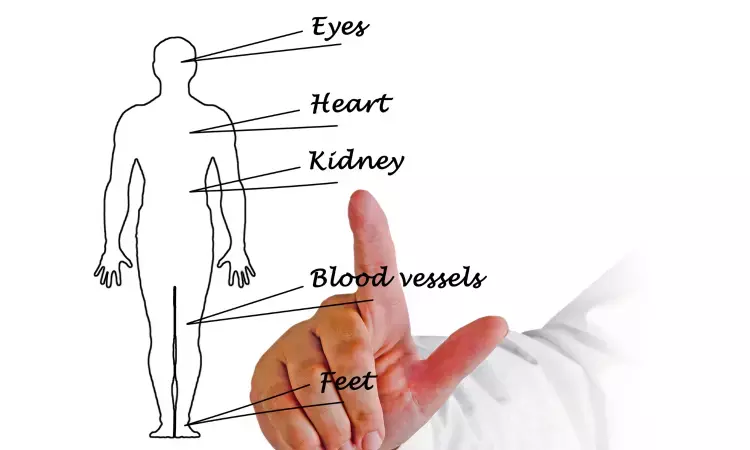- Home
- Medical news & Guidelines
- Anesthesiology
- Cardiology and CTVS
- Critical Care
- Dentistry
- Dermatology
- Diabetes and Endocrinology
- ENT
- Gastroenterology
- Medicine
- Nephrology
- Neurology
- Obstretics-Gynaecology
- Oncology
- Ophthalmology
- Orthopaedics
- Pediatrics-Neonatology
- Psychiatry
- Pulmonology
- Radiology
- Surgery
- Urology
- Laboratory Medicine
- Diet
- Nursing
- Paramedical
- Physiotherapy
- Health news
- Fact Check
- Bone Health Fact Check
- Brain Health Fact Check
- Cancer Related Fact Check
- Child Care Fact Check
- Dental and oral health fact check
- Diabetes and metabolic health fact check
- Diet and Nutrition Fact Check
- Eye and ENT Care Fact Check
- Fitness fact check
- Gut health fact check
- Heart health fact check
- Kidney health fact check
- Medical education fact check
- Men's health fact check
- Respiratory fact check
- Skin and hair care fact check
- Vaccine and Immunization fact check
- Women's health fact check
- AYUSH
- State News
- Andaman and Nicobar Islands
- Andhra Pradesh
- Arunachal Pradesh
- Assam
- Bihar
- Chandigarh
- Chattisgarh
- Dadra and Nagar Haveli
- Daman and Diu
- Delhi
- Goa
- Gujarat
- Haryana
- Himachal Pradesh
- Jammu & Kashmir
- Jharkhand
- Karnataka
- Kerala
- Ladakh
- Lakshadweep
- Madhya Pradesh
- Maharashtra
- Manipur
- Meghalaya
- Mizoram
- Nagaland
- Odisha
- Puducherry
- Punjab
- Rajasthan
- Sikkim
- Tamil Nadu
- Telangana
- Tripura
- Uttar Pradesh
- Uttrakhand
- West Bengal
- Medical Education
- Industry
Bariatric surgery may help reverse peripheral neuropathy in diabetes patients

USA: Researchers from the University of Michigan have investigated the effects of bariatric surgery on diabetes complications in obese individuals having class II/III obesity. According to them, bariatric surgery is a practical approach to reversing peripheral neuropathy (PN) and stabilising cardiovascular autonomic neuropathy (CAN) and retinopathy in obese individuals with a history of diabetes.
Evan L. Reynolds was the lead researcher of the study, and the study was published in Diabetologia.
The cases of type 2 diabetes are increasing worldwide. The condition's complications are peripheral neuropathy (PN), cardiovascular autonomic neuropathy (CAN) and retinopathy.
The individual risk factors for metabolic syndrome (frequently comorbid with type 2 diabetes), like obesity, hypertension, low HDL-cholesterol and hypertriacylglycerolaemia, are also related to PN and CAN. These are not consistently associated with retinopathy.
Central obesity is the second leading risk factor for Peripheral Neuropathy after diabetes.
There needs to be more data and information related to interventions that simultaneously target multiple metabolic risk factors are required, given the independent effects of metabolic risk factors on complications of diabetes.
Though previous studies have shown the effect of bariatric surgery on diabetes complications, these limitations include a small sample size and limited outcome measures. Further investigation requires more data to determine if bariatric surgery can reduce diabetes complications. Also, there is a need for more research to determine whether changes in specific metabolic risk factors improve diabetes complications.
Considering this background, researchers investigated the aforementioned gap and added the following points in their investigation, which could be summarised:
- The researchers performed a prospective cohort study of obese participants (n=127) who underwent bariatric surgery.
- Participants underwent metabolic phenotyping and assessments of diabetes complications at baseline and two years after surgery.
- PN, CAN and retinopathy were the primary outcomes.
- Seventy-nine participants of age 46 years completed in-person follow-up.
- Participants lost a mean of 31.0 kg.
- There was an improvement in all metabolic risk factors except for BP and total cholesterol.
- There was an improvement in PN outcomes (IENFD or intra-epidermal nerve fibre density proximal thigh, +3.4 ± 7.8and CAN (E/I ratio −0.01 ± 0.1) following bariatric surgery.
- Retinopathy was stable. Due to a more significant reduction in fasting glucose, there were improvements in retinopathy with a mean deviation point estimate of −0.7.
They said two years after bariatric surgery, we found that one of our two primary PN outcomes, two secondary PN outcomes and several PN-related patient-oriented outcomes improved after surgery.
Our results from the present study, combined with other small studies, suggest that bariatric surgery enables the regeneration of peripheral nerves. Hence, it is an effective therapy for obese individuals.
We found that IENFD of the distal leg was stable after bariatric surgery, suggesting that reversing damage to the more severely affected distal nerves is more complicated. This requires longer follow-up for further evaluation.
Study limitations included:
- Small sample size.
- Lack of a control group.
- Loss of follow-up.
- Unknown longer-term effects of bariatric surgery.
Further reading:
Reynolds, E.L., Watanabe, M., Banerjee, M. et al. The effect of surgical weight loss on diabetes complications in individuals with class II/III obesity. Diabetologia (2023). https://doi.org/10.1007/s00125-023-05899-3
BDS, MDS in Periodontics and Implantology
Dr. Aditi Yadav is a BDS, MDS in Periodontics and Implantology. She has a clinical experience of 5 years as a laser dental surgeon. She also has a Diploma in clinical research and pharmacovigilance and is a Certified data scientist. She is currently working as a content developer in e-health services. Dr. Yadav has a keen interest in Medical Journalism and is actively involved in Medical Research writing.
Dr Kamal Kant Kohli-MBBS, DTCD- a chest specialist with more than 30 years of practice and a flair for writing clinical articles, Dr Kamal Kant Kohli joined Medical Dialogues as a Chief Editor of Medical News. Besides writing articles, as an editor, he proofreads and verifies all the medical content published on Medical Dialogues including those coming from journals, studies,medical conferences,guidelines etc. Email: drkohli@medicaldialogues.in. Contact no. 011-43720751


